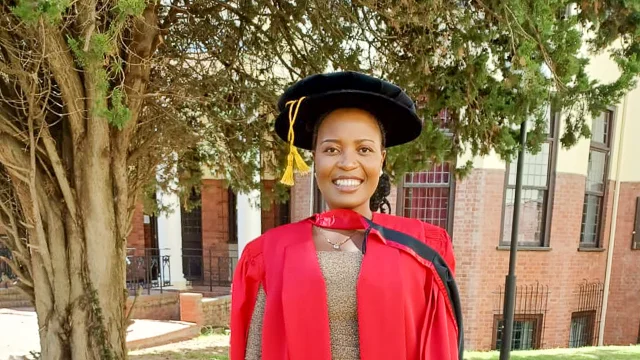
By Denzel Nyathi
During the recent Rhodes University graduation ceremonies, Sandile Phakathi was conferred her PhD through the Department of Economics and Economics History, where she is also a lecturer in the New Generation of Academics Program (nGAP).
From being born in a rural area in Uitvaal, Ladysmith, KwaZulu-Natal, Dr Phakathi has come a long way to where she is today but has never lost track of the importance of honouring the place she calls home in her work.
That very same hometown saw to it that she would be where she is today. When she was in Grade 10, her father passed away. The tragic ordeal had subsequently tragic financial complications for the family.
“The only thing that will take me out of poverty is education,” a young Sandile told herself, with conviction.
She worked incredibly hard to leave high school with good marks. It was these good marks that made her high school teacher believe that she could easily make it into university, with the assistance of funding once registered.
In 2009, the year following her matriculation, she was offered a place to study a Bachelor’s Degree at the University of KwaZulu-Natal. Unfortunately, she could not raise the necessary funds to register as a student at UKZN. “I had to go back home and that was so painful,” she reflected. “I wasn’t doing anything.”
She tried to enrol in short courses in the latter half of the same year at Majuba College in KwaZulu-Natal. Again, she unfortunately could not finish any of those short courses because of financial constraints. With just an older sister working at a Spar in Johannesburg, she merely had R200 to work with every month. She did not have financial means to sustain her studies.
When the following year came around, Sandile’s high school teacher contacted her. Realising the obstacle that finances were posing to a promising young student, he offered to pay her student meal allowances and accommodation. Sandile managed to register for a BSc in Agricultural Economics at the University of KwaZulu-Natal in 2010. This gave her the strength to try again – and she was successful at receiving student financial aid in the second semester, and in her second year she received a bursary from the Department of Agriculture and Rural Development.
She proceeded to overcome her own academic anxieties and subsequent depression that came from fear of financial distress. That’s why Dr Phakathi exemplified, in her lecturing and supervising of numerous Honours and three Master’s candidates, a philosophical inclination towards “humanising pedagogy”.
“You have to love your students; you have to take care for them. And, at the same time, you must make sure that every process is fair and just,” Dr Phakathi said. In the same way her teacher recognised that it was not fair that financial concerns should hinder a capable student’s ability to learn and excel, she carried that same attitude into her work as a lecturer. A deep empathy was born from her personal struggles.
Keeping in line with her philosophy of humanising pedagogy, her research looked into institutional innovations for improving water security in the smallholder irrigation schemes within the Eastern Cape and Kwa-Zulu Natal. On top of doing an unconventional PhD approach – specifically by doing PhD via publication – she is actively planning to return to the farmers she interviewed, such that the academic process may benefit their lives in a real and tangible way.
“The main reason I chose to focus my research in the Eastern Cape is because I credit Rhodes University for instilling in me the importance of teaching leadership and community engagement within research,” she said. “My research focus will help uplift the Eastern Cape province. I also work and live here, and as they say, charity begins at home.”
The Department of Economics and Economics History as well as the Commerce Faculty and indeed Rhodes University at large is proud to see an academic who is willing to invest so much in the Province. Dr Phakathi’s PhD is thus a testament to not just her academic prowess, but a life of Ubuntu.
